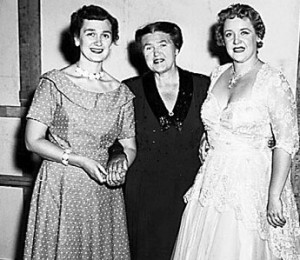 Eleanor Steber remembers Lehmann
Eleanor Steber remembers Lehmann
Sherman Zelinsky sent us a photocopy of a chapter in the new “Eleanor Steber: An Autobiography” in which she recalls her “geliebte Lotte.”
In 1943, during a time when she was singing Sophie with Lehmann’s Marshallin, Steber attended Lehmann’s annual Town Hall concert in New York. In her journal she wrote: “I am almost glad I had to wait until now to hear her in concert, for now my own experience makes it possible for me to at least glimpse her perfect gift. She is divine! Had I only heard her earlier, perhaps I might have realized sooner that miracle which comes from such complete sublimation of ‘self’ to the ‘song.’ Lehmann was so completely absorbed and surrounded by the music and the poetry, I felt as if I were in a holy place.”
Steber studied with Lehmann shortly thereafter, working on Brahms and Schumann songs. “She taught me how to create my own uniquely personal relationships to my songs.”
In a 1943 letter from Lehmann, her teacher and friend exhorts her, “Your words will be as expressive as your melody. You will become a ‘singing actress.’ Music and poem will float into one being. There is, however, always the danger of exaggerating the word. One has to be very subtle and to balance music with poem in the right way…My God, it took me half a lifetime to develop my way! But I had no one to show me. I had to go quite alone on a path which seemed, to many singers, exaggerated, and was perhaps exaggerated before it settled down into my whole being. Now it is a part of me and cannot be separated from me any more. Even if I would not have success with my singing or would not find understanding, I know with all my heart and brain that what I do is right!”
Steber in 1951 received a wire from a friend warning her that Lehmann’s upcoming Town Hall concert might be her last. Steber grabbed a plane and rushed home in the midst of a concert tour to gather with the crowd of friends and fans who packed the concert hall that day. She describes the beautiful concert and the heartbreak of the encore, “An die Musik,” in which Lehmann’s voice broke with emotion on the final phrase, leaving accompanist Paul Ulanowsky to finish the last line alone. It was an immensely moving moment, witnessed by a friend and colleague who appreciated Lehmann’s gift. —JS
